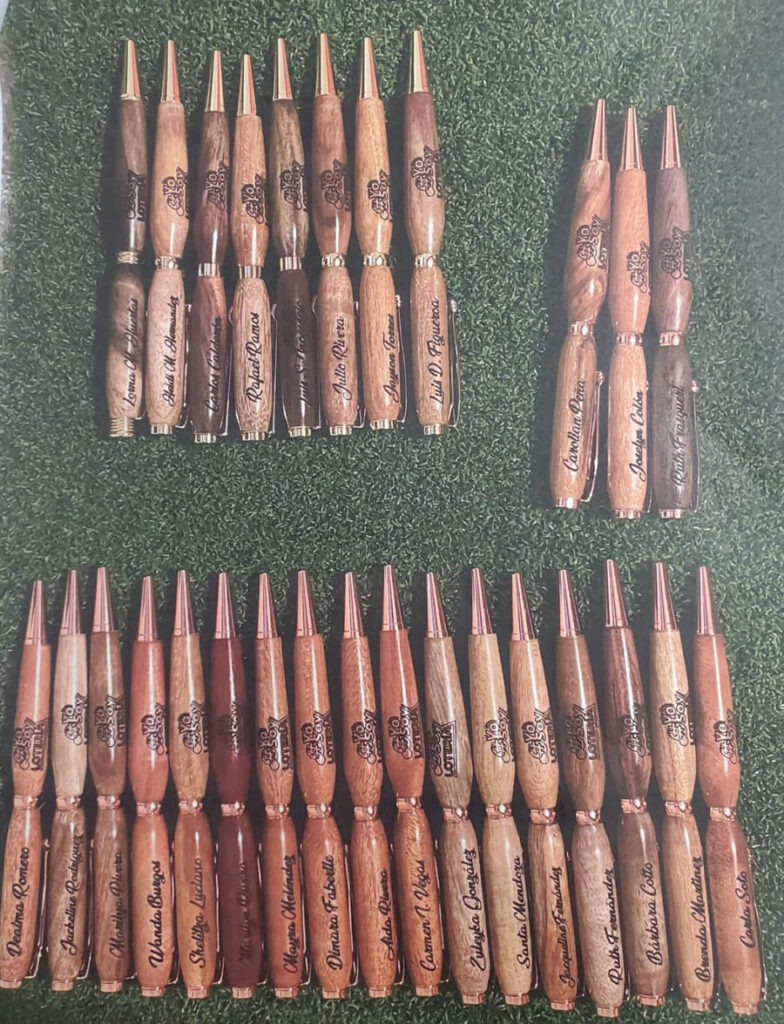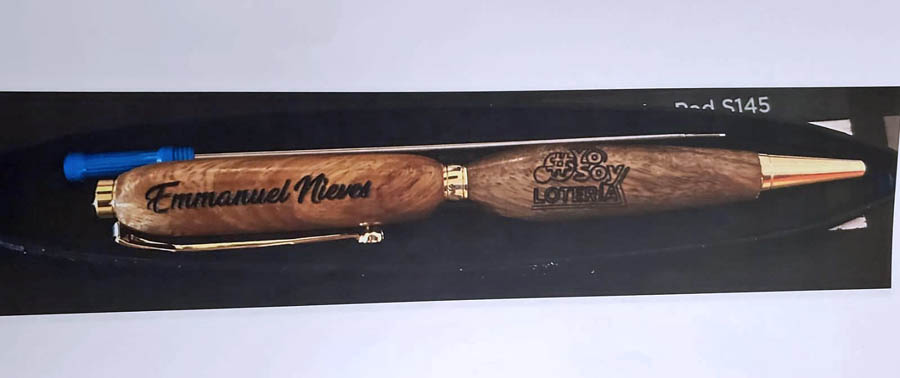Puerto Rico lottery: A jackpot of public money and political favors

By José Encarnación Martínez, Vanessa Colón Almenas, and Wilma Maldonado Arrigoitía | Centro de Periodismo Investigativo
In this “drawing,” there are prizes for those who win a contract and for those who award it. Landing such a deal can bring in significant money, while those who spin the wheel of public funds secure VIP treatment: parties, event tickets, and gifts. Here, public money flows freely.
For advertising agencies in Puerto Rico, winning the account for the Electronic Lottery and the Traditional Lottery — both under Puerto Rico’s Department of the Treasury — is almost like hitting the jackpot. This client regularly purchases ad placements in the media and on billboards, and its advertising agency collects a 15% commission on those buys. The more ads, the higher the commissions, explained retired publicist José López.
“The commission [that the advertising agency charges] depends on the agreement. If the billing is high, the commission will be substantial,” López added. Digimedia, the advertising agency that secured the Treasury Department’s account, has watched its contracts balloon from $4.1 million in November 2019 to $47.2 million by August 2025, most of it through amendments to the original deals.
While the contract technically covers Treasury’s expenses, nearly all the advertising has been directed to the Lottery Bureau, a division of the Treasury Department that runs Puerto Rico’s Traditional Lottery and the Electronic Lottery (officially called the Additional Lottery).
Invoices reviewed by the Centro de Periodismo Investigativo (CPI), following a public-records lawsuit, reveal that the Lottery Bureau has entrusted Digimedia with virtually every type of event: from breakfasts and luncheons for as few as 15 people to large-scale productions featuring local performers.
The invoices also show that public funds have repeatedly been used for events where government employees indulge their personal interests — celebrating birthdays, attending concerts, and enjoying sporting events — all tied to sponsorships that the Bureau provides.
Digimedia’s owners are Miguel Ortiz Zayas and David Habibe Vargas, who also own Mozart Advertising. According to the Department of State, Miguel Ayala Ayala is Digimedia’s administrator. Mozart Advertising, incorporated in 2014, works primarily with private-sector advertising accounts, while Digimedia, established two years later, handles government contracts.
Since 2015, Habibe Vargas has contributed to the political campaigns of candidates from the New Progressive Party, which advocates statehood for Puerto Rico, while Ortiz Zayas began donating in 2022.
Digimedia manages an annual advertising budget of more than $12 million for the Treasury Department. In addition to fees and commissions, the Treasury Department pays the firm a monthly base fee that started at $44,500 and has climbed to as much as $87,000.The base fee covers services such as graphic design, digitization, ad copywriting, social media content, and basic community management, as well as media planning and buying, digital campaign optimization, and account management.
“Special services” — including event production and coordination, the purchase of promotional merchandise, supervision of television and radio shoots, and creative direction and concept development — are not covered by the base fee and are billed separately.
With Digimedia at the helm, the Lottery Bureau has morphed into something resembling an event producer, ostensibly to promote lottery games. Putting on these shows required Digimedia to subcontract producers and staging specialists for elaborate platforms, and even artisans who crafted one-of-a-kind wooden pieces.
The Treasury Department, whose mandate includes ensuring the government’s fiscal stability, assigned Digimedia to purchase goods and services through intermediaries that inflated the prices ultimately paid by Puerto Rican taxpayers, invoices show.
In March 2023, the Bureau ordered Digimedia to procure 30 pens engraved with officials’ names, as if they were promotional items. They were distributed among several Lottery employees, including then-assistant secretary Lorna Huertas Padilla, bureau executives, and other staff. The 30 pens cost $650, but the Treasury Department ended up paying $1,747 because Digimedia charged $1,000 for coordination, production, and supervision of the purchase, plus a $97.50 agency commission.
The pens were delivered in April 2023, along with notebooks bearing the Traditional Lottery’s logo, during Administrative Professionals Week and Secretary’s Day. For that, the advertising agency billed an additional $1,500.
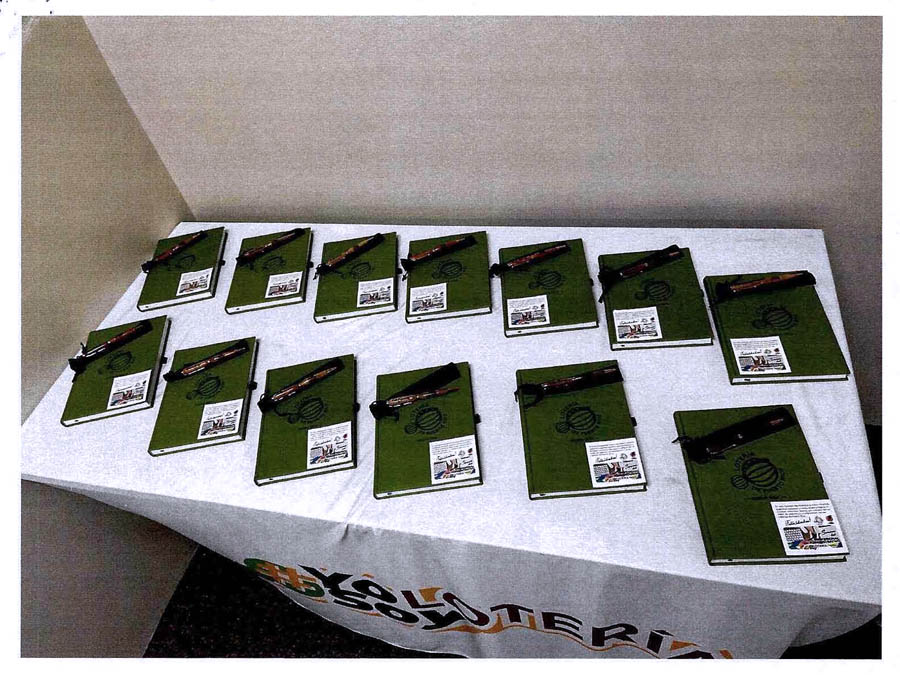
The Treasury Department even delegated to Digimedia the task of placing a small acrylic plaque at the Electronic Lottery’s reception desk, organizing traditional Puerto Rican Christmas caroling parties, known as parrandas, and handing out prizes to winners of halftime shooting contests at games sponsored by the Lottery Bureau with the International Basketball Federation and Puerto Rico’s National Superior Basketball League (BSN, in Spanish). For those “services,” Puerto Rican taxpayers footed the bill for commissions and coordination fees.
More parties, perks, and pricey extras — Coordinated by Digimedia
When recognizing two Electronic Lottery employees, the Bureau did not rely on its own staff for the arrangements. Instead, it asked Digimedia to order two plaques and two gourmet baskets with flowers. The items cost $468.30, but the invoice ballooned to $1,468.30 after an additional $1,000 was added for “coordination, management, and supervision of the activity.”
“When you subcontract something, you’re almost certainly charging more so you can pocket a percentage,” Puerto Rico Comptroller Yesmín M. Valdivieso Galib told the CPI.
The CPI confirmed that Digimedia billed $135 for each of the two baskets containing wine and flowers. However, the invoice Treasury provided to the CPI did not list the wine among the items billed, showing only the flowers, while keeping the price at $135 per basket. The CPI obtained another invoice, dated the same day and covering the same purchase, that did itemize the wine as part of the order. What’s more, the wine-and-flower baskets were photographed by the Lottery Bureau itself, as evidenced by a picture posted on the agency’s official Facebook page. The final cost per basket was $150.52, including sales tax.
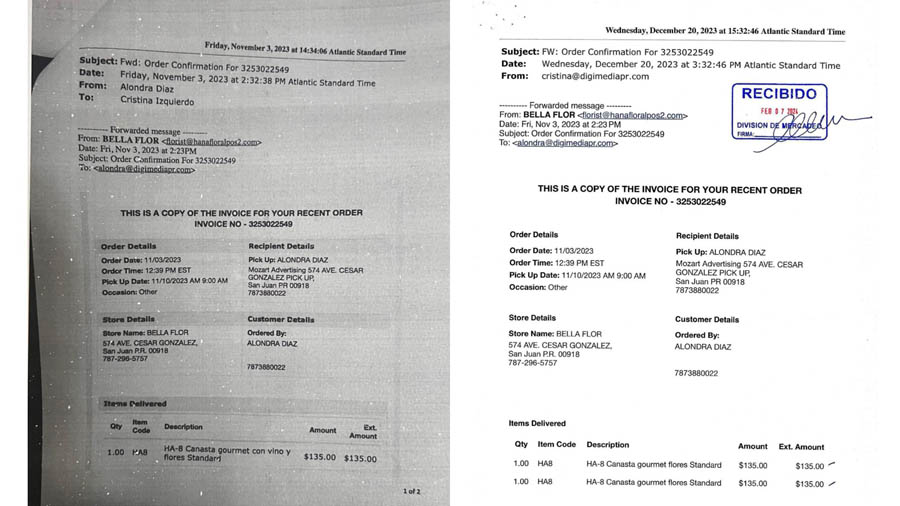
In Puerto Rico, government agencies are prohibited from purchasing alcoholic beverages with public funds.
In November 2023, the Traditional Lottery processed an invoice using Digimedia for “coordination, supervision, and refreshments for guests at the Government Ethics Commemorative Ticket event, drawing 443.” The event consisted of welcoming then-Deputy Director of the Office of Government Ethics, Aniano Rivera Torres, to mark the occasion. The refreshments cost only $57.78, but the Bureau paid Digimedia an additional $1,500 for coordination.
A similar expense was incurred in the months before and after, during the launch of commemorative tickets for the University of Puerto Rico, the animal-welfare program of the Municipality of Caguas, the Department of Corrections, and other public and private entities. For this type of activity, the advertising agency has billed between $1,000 and $2,500 for coordination, management, and supervision fees.
One invoice from Digimedia, dated July 31, 2024, to the Lottery Bureau claimed $1,500 for coordinating a breakfast for 40 people. The cost of the breakfast itself was $550, but Digimedia added $82.50 as its 15% agency commission on the food. The total came to $2,132.50, nearly four times the cost of the meal, which included scrambled eggs with ham and cheese, bread rolls, baked potatoes, juice, coffee, and water.
“The coordination of breakfasts and luncheons should not fall under an advertising contract. Contracts can cover various things, different services, but when they involve absurdities, like handling advertising and at the same time organizing breakfasts, that really raises a red flag,” said the Comptroller. “If I’m going to host a breakfast, I [the government] contract the service. Why should I pay you to organize it? It’s something that needs to be looked at,” she added.
On Nov. 16, 2023, the Bureau delegated to Digimedia the organization of a Thanksgiving luncheon for 50 Electronic Lottery employees. The invoice shows the meal cost $749.50, but the advertising agency added another $1,000 for, once again, “coordination and supervision” of the lunch.
Six days later, a second Thanksgiving meal was held, this time at the Traditional Lottery, for $1,649. Digimedia charged an additional $1,000 for coordination and supervision, bringing the total to $2,649.
Puerto Rico’s Accounting Act requires agency heads “to avoid expenditures of public funds that are extravagant, excessive, or unnecessary.” The statute defines an extravagant expense as one that does not meet prevailing standards of utility and austerity; an excessive expense as one where goods or services are paid at a higher price than normally quoted in the market; and an unnecessary expense as one for materials or services that are not essential to the agency’s duties.
In July 2022, during basketball games between Puerto Rico, the United States, and Mexico, eight $250 prizes were awarded to fans who scored baskets during halftime, as part of a promotion sponsored by the Electronic and Traditional Lotteries. The Lottery not only paid Digimedia $3,000 for coordinating this halftime “challenge,” but also $300 — equivalent to 15% of the prize money won by the contestants.
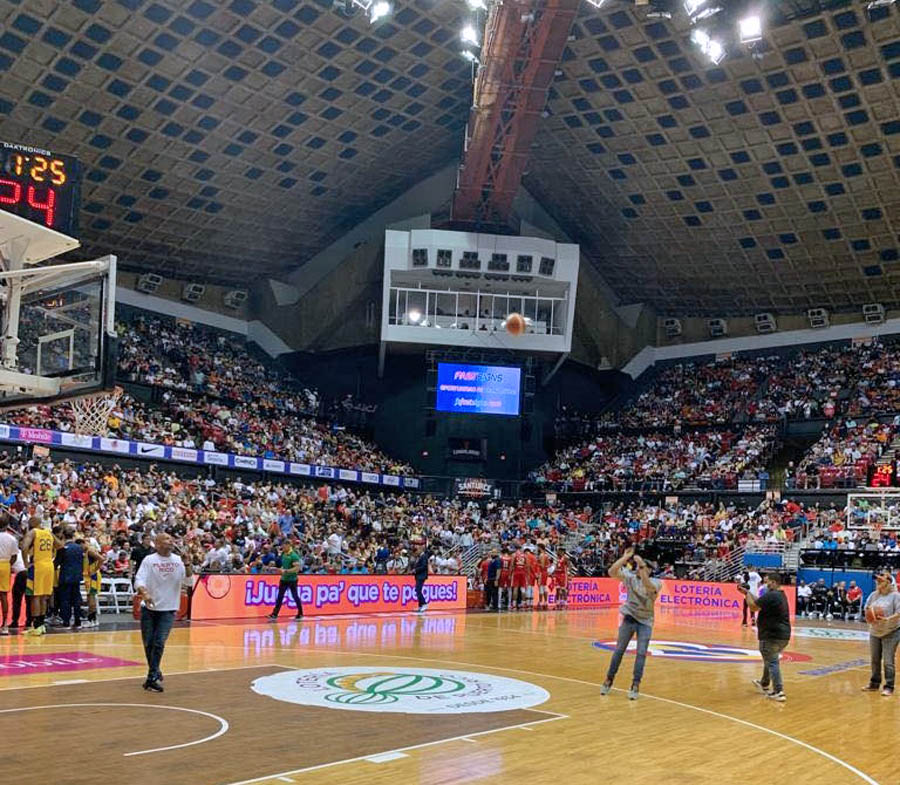
The Bureau also paid for the creative concept behind the “Electric Summer” contest and awarded Digimedia $9,000 as a 15% commission on the $60,230 in prizes distributed among contestants. In other words, when a player won a $30,000 prize, Digimedia received a bonus, collecting $4,500 from the Treasury Department in the form of a commission paid on that prize.
Similarly, the Lottery Bureau repeatedly tasked the advertising agency with purchasing T-shirts for on-air hosts during prize broadcasts, instead of buying directly. Each order was inflated by 15% to cover the agency’s commission, invoices show.
The Comptroller said that any agency purchases of materials made without a bidding or quotation process must be reviewed “carefully,” since commissions or fees can unnecessarily drive up government costs. She added that in certain cases related to promotion and marketing, the involvement of an advertising agency may be warranted, but stressed that each case must be analyzed.
Inspector General Ivelisse Torres Rivera also cautioned that Act 237 of 2004, which establishes uniform parameters for contracting professional and consulting services, is meant to ensure these contracts “entered into by government agencies adhere to criteria of necessity, reasonableness, transparency, and fiscal responsibility.”
“[Given] the possibility that an outside firm, such as an advertising agency, may coordinate or bill for expenses like breakfasts, luncheons, promotional materials, or other items, it is important to stress that this type of process must be carefully evaluated to ensure that the agency does not delegate its own duties, especially those involving the direct use of public funds without proper controls,” the Inspector General told the CPI when asked about the fiscal oversight government agencies should apply when using intermediaries to acquire goods and services.
According to data provided by the Treasury Department and analyzed by the CPI, both lotteries generate roughly $667 million in annual sales.
The last three contracts with Digimedia began as agreements of about $1 million each to provide services for one month. Before the terms expired, they were amended, in some cases to nearly 10 times the original amount. Since July 2025, when the new fiscal year began, contracts with the advertising agency have been signed month to month.
The $47.2 million Digimedia has billed over six years has covered advertising and promotional services for the Electronic Lottery, the Traditional Lottery, and the Treasury Department. Yet the Treasury’s share of that total is less than 5%, compared to, for example, the Electronic Lottery, which accounts for 63% of the spending.
Your luck how, at your fingertips!
The 33rd anniversary of Pega 3 — a popular daily lottery game in Puerto Rico — was celebrated on November 10, 2023, at Distrito T-Mobile, a large entertainment complex in San Juan, where two VIP sections were reserved. The VIP Arena Medalla, a beer-branded venue inside the complex, was set aside for Treasury Department executives, while the VIP Coca-Cola Music Hall, one of Puerto Rico’s premier concert venues, hosted the Lottery Bureau’s management. In the main plaza of the Distrito, the public gathered for a show with live music and prize giveaways.
That night, during the anniversary festivities, then-assistant secretary of the Lottery, Lorna Huertas Padilla, also celebrated her birthday with employees, friends, and family, according to photos taken in a VIP space at the Coca-Cola Music Hall.
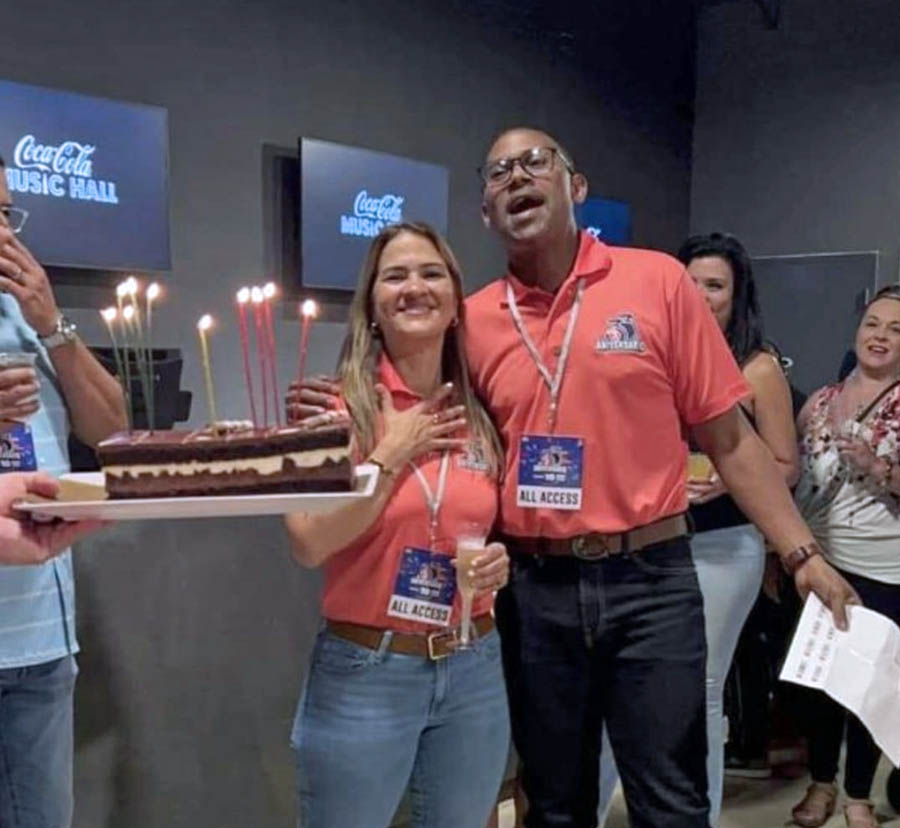
One of the invoices submitted by ASM Global, which manages the Coca-Cola Music Hall, to The Smile Group Advertising — a Digimedia subcontractor — shows $4,140 in alcoholic beverages were consumed, according to documents reviewed by the CPI. The Treasury Department provided the CPI with an invoice labeled “Puerto Rico Lottery Cocktail November 10, 2023,” which omitted the alcohol expenses. The CPI obtained another invoice from the same event that did include those charges.
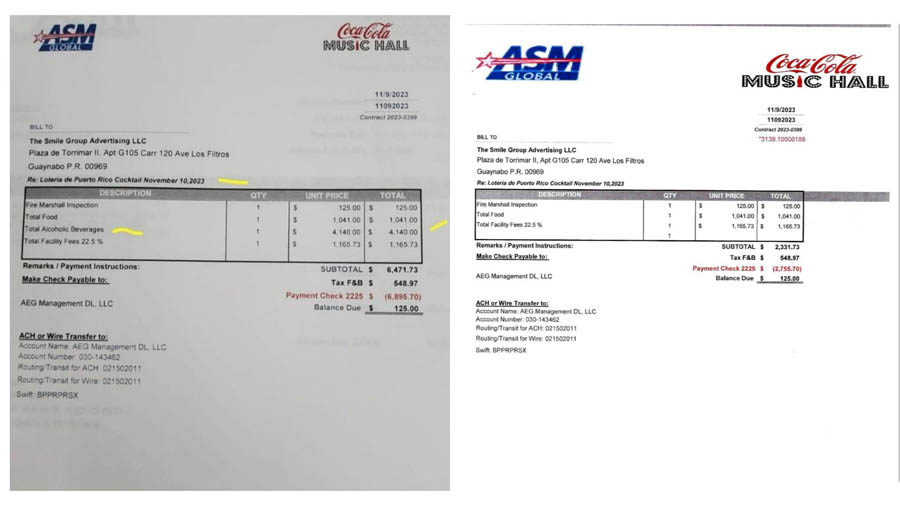
Alcohol consumption at official activities or during work hours appears to have become such a problem inside the Lottery Bureau that, in 2022, the then–assistant secretary warned employees via WhatsApp that she did not want anyone drinking alcohol while on the job. This represented a sharp shift from her stance just months earlier, when, in a chat with her closest staff — whom she referred to as her “little grasshoppers,” borrowing the nickname from the TV series Kung Fu — she had convened official meetings at her home with beer, wine, and vodka.
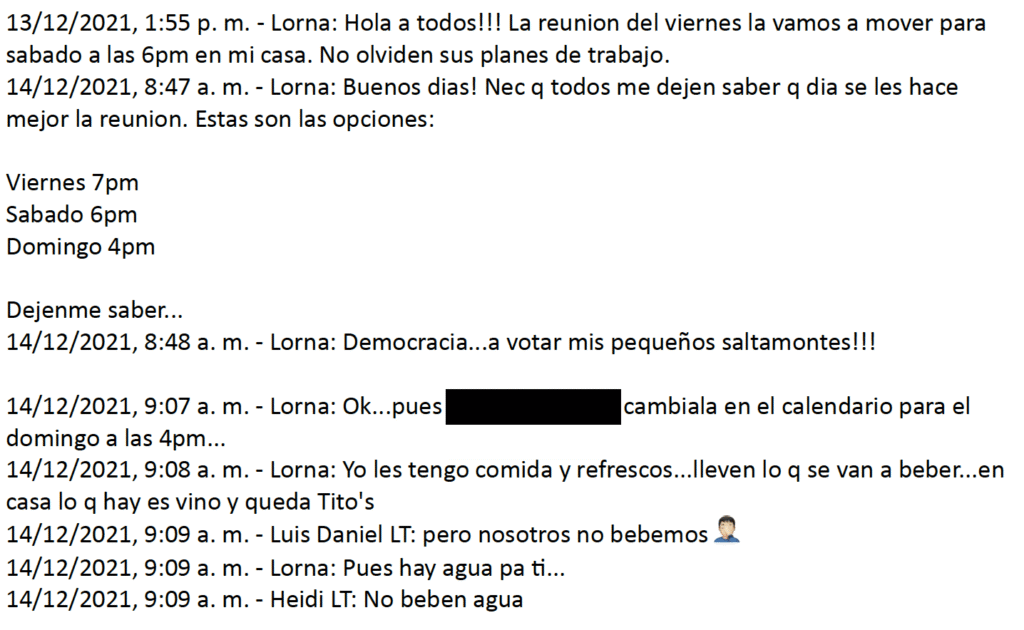
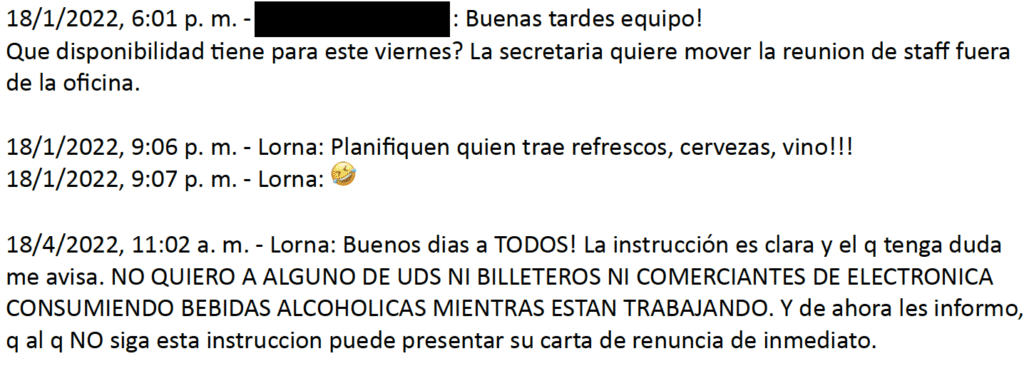
At the Pega 3 anniversary event, performances by El Gran Combo, Joseph Fonseca, Norberto Vélez, and La Tribu de Abrante were paid for with public funds. The four acts cost $56,000.
Digimedia charged an additional $8,400 in commissions for booking them. Renting recreational spaces at Distrito T-Mobile came to $37,500.60, and the advertising agency added $5,625.09 in fees for handling that subcontracting, for a total of just over $43,125.69 in public money.
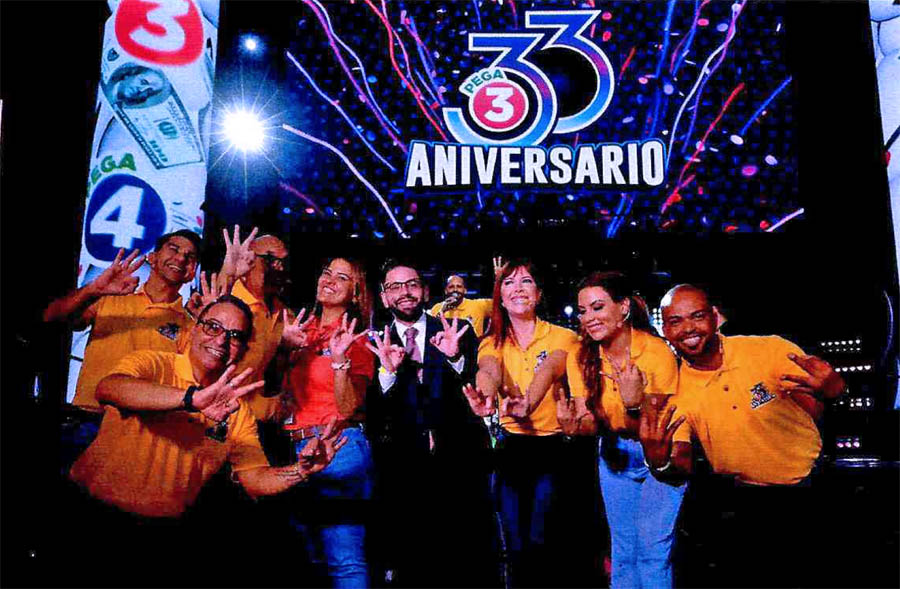
Negotiations between the advertising agency and Distrito T-Mobile for the 33rd anniversary of Pega 3 took place between June and July 2023. Coincidentally, the quote for the event was finalized the same week that Ángel Pantoja-Rodríguez — then deputy Treasury secretary and now the Treasury secretary — hosted a private gender-reveal party for his second child at Popular Plaza in Distrito T-Mobile, where his brother, Luis Alejandro Pantoja-Rodríguez, is brand and creativity manager.
The Secretary denied to the CPI that the party was a gift, insisting the event had nothing to do with Treasury’s contracts at the time, when he was deputy secretary.
“I paid [for that event],” he told the CPI firmly. “I can show you the invoice,” he said, but never produced it despite repeated follow-up requests by the CPI.
ASM Global did not respond to multiple attempts by the CPI to obtain more details about the event.
The family celebration was attended by then–Treasury Secretary Francisco Parés Alicea, as well as other officials. It was documented and posted on YouTube on July 6, 2023, by Fronthouse Media, a creative agency incorporated in 2021 that focuses primarily on entertainment.
“Want more? Then keep playing”
In February 2021, two months after Huertas Padilla was appointed assistant secretary of the Lottery Bureau, the advertising agency coordinated a “media coaching” session for her. The training covered topics such as a media profile, what constitutes news, types of news, building good relationships with the press, and public speaking.
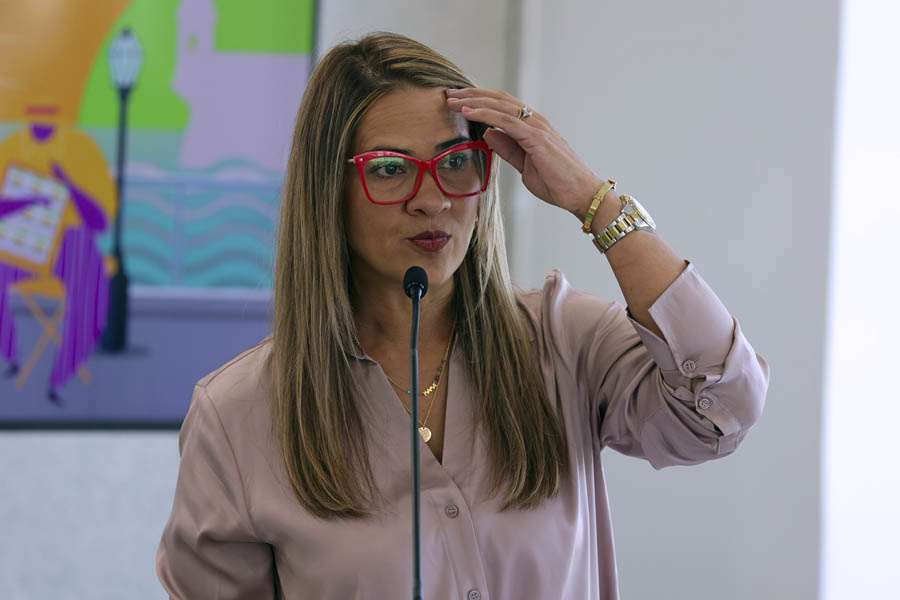
Digimedia did not use its own staff to train Huertas Padilla, who is the daughter of New Progressive Party senator Migdalia Padilla. Instead, it subcontracted four outside consultants for the session for $3,250, plus a $442.50 commission for the agency. This was done even though the Electronic Lottery has a marketing division, and the Treasury Department has its own Communications Office.
The marketing division employs seven people, including an executive officer and a marketing and promotions manager, while the Communications Office employs six, including a trusted adviser. Together, the two offices have a monthly payroll of $55,358.
The Comptroller told the CPI that it is the responsibility of agency directors to ensure contracts are for necessary services, do not duplicate existing duties, and are properly monitored.
“You have to make sure, first of all, that it was necessary to contract out the service because you didn’t have staff to perform that duty,” Valdivieso said.
The Bureau also uses its advertising agency to handle interagency processes. For example, public TV station WIPR billed $31,669.65 for changes to the set where the Electronic Lottery drawings are held. But the transaction was not processed directly with Treasury; instead, WIPR billed Digimedia, which then sought reimbursement from Treasury. The charge was added to the invoice with a $4,750.45 commission.
Although Huertas Padilla no longer holds her position at the Lottery Bureau —she resigned last October after being questioned by the CPI— officials involved in these decisions remain in key roles. They include the current assistant secretary of the Lottery, Heidi Hernández Olivo; the deputy director of the Traditional Lottery, Carlos Javier Calderón Ayala; and the director of operations of the Traditional Lottery, Rafael Ramos Pérez.
The CPI made several attempts to interview the owners of Digimedia. After initially agreeing and requesting three weeks to prepare, the interview was never granted.
In a written statement, the agency said: “We appreciate your communication and the genuine interest of the Centro de Periodismo Investigativo in examining the use of public funds, a fundamental effort for transparency and accountability in our society.” But it referred all questions to its client, the Treasury Department. Although the CPI made clear its interest in clarifying issues related to billing, the advertising agency refused to respond.
For its part, the Treasury Department defended its advertising spending and budget distribution.
“Investment in advertising, promotions, and events is a key tool to boost visibility, position a product in the market, and motivate consumer decisions. At the Puerto Rico Lottery Bureau, these actions have driven sales of both the Traditional and Electronic Lotteries,” the Treasury Department said in a statement sent to the CPI.
The Lucky Island
While Puerto Rico, engulfed in a years-long debt crisis and bankruptcy process, carries a public debt with interest payments nearing $64 billion, last year the Lottery Bureau staged a lavish five-day event called The Lucky Island, bringing together top lottery executives from the United States, Canada, and the U.S. Virgin Islands. The entertainment lineup for this “work meeting” included a bossa nova ensemble, the orchestra of Humberto Ramírez, La Tribu de Abrante, an ‘80s and ‘90s band, a Beach Boys cover band, and DJs.
As part of the social activities offered to guests, events were held at Arena Medalla in Distrito T-Mobile, at Vivo Beach Club (a beachfront entertainment venue in Isla Verde), and at the Royal Sonesta San Juan hotel. According to invoices, the Arena Medalla activity hosted 150 people for four hours and cost $25,411, including Digimedia’s commission. The Vivo Beach Club gathering came to $15,644, also with the agency’s commission included.
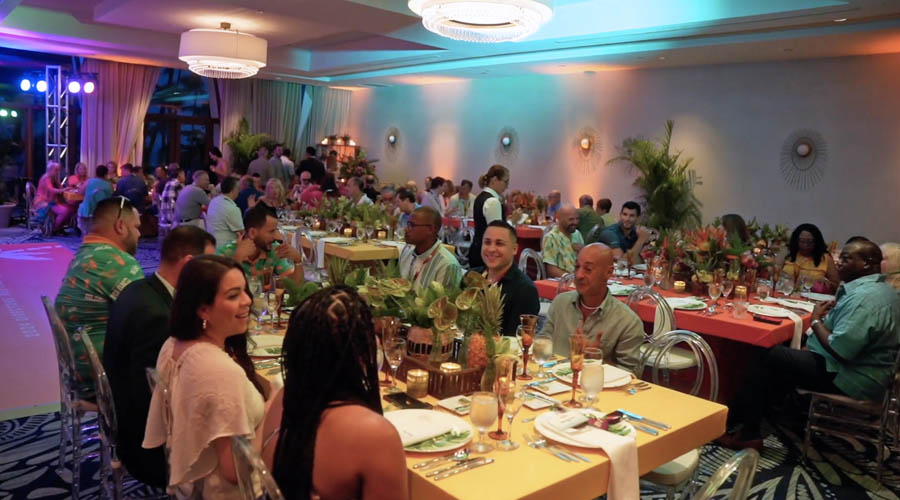
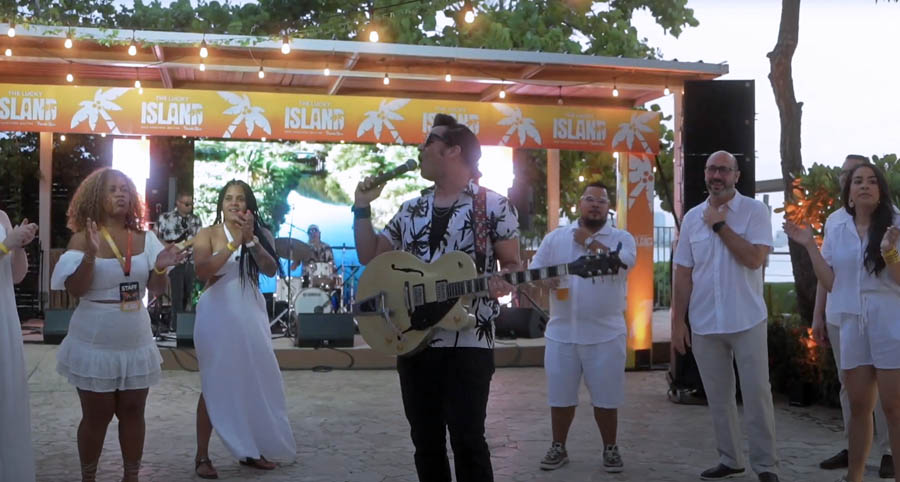
The total cost of the event reached $280,166. That included an invoice from The Smile Group, a Digimedia subcontractor, for $176,466 covering the planning of the three activities, artist fees, and setup and takedown, according to documents the Treasury Department provided to the CPI.
Digimedia billed the Lottery Bureau $32,499 in commissions for its work, which was added to the final balance. Ahead of the event, Digimedia also invoiced $23,780 — including commissions — for invitations and a promotional video.
This year, the Lottery Bureau has continued the pattern of staging events. For example, in the summer, it held activities in Ponce and Aguadilla to mark the 35th anniversary of the Electronic Lottery.
* CPI Editor’s Note: This translation was generated with the assistance of AI and reviewed by our editorial team to ensure accuracy and clarity.

